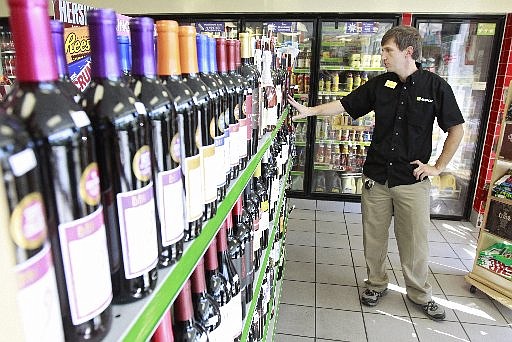NASHVILLE - The compromise wine-in-grocery-stores bill up for committee review in the state House of Representatives Tuesday would not allow wine sales in grocery stores until July 1, 2016 - and those within 500 feet of a liquor store a year later unless the liquor retailer agrees.
The compromise unveiled Tuesday morning in the House State Government Committee also requires a minimum 20 percent markup from the wholesale price of wine - an attempt to prevent grocers from undercutting liquor stores on price.
The compromise proposal allows "big box" retailers like Walmart and Target and larger convenience stores to sell wine. In order to qualify for wine sales, a "retail food store" must derive at least 20 percent of its sales from food items that are taxed at the state's discounted 5 percent food tax rate and have retail floor space of at least 2,000 square feet, which would exclude smaller convenience stores.
Grocery wine sales would be permitted only in towns, cities and counties whose residents approve it in referendums. The referendums could be held, starting with this November's general election, only in towns, cities and counties with retail liquor stores or liquor by the drink.
No wine sales could occur on Sundays under the compromise as it now stands.
The compromise plan was adopted by the State Government Committee as an amendment that totally rewrites House Bill 47. The committee adopted the amendment in a morning meeting but then delayed a vote on the bill itself to 4:30 Tuesday afternoon to give members time to review the 29-page amendment.
The amendment says the Tennessee Alcoholic Beverage Commission may not begin to issue retail food store wine licenses until July 1, 2016, and no food store can sell wine prior to that date - although the ABC may accept and begin processing applications prior to that date.
However, grocery stores that are within 500 feet of an existing retail liquor store can't begin selling wine until July 1, 2017, "unless the (Alcoholic Beverage) commission receives written permission from" the liquor retailer.
But if the liquor store refuses to give permission, the liquor store also won't be permitted to sell beer, cigarettes, food, mixes and other items that the compromise allows them to sell in return for grocery stores selling wine.
There was a brief attempt in the House committee to send the bill back to its subcommittee for review because the amendment was added to a bill that was previously written to decrease the residency requirement for liquor retailers.
"I think we were deceived," said Rep. Kent Williams, R-Elizabethton, who moved to send it back to subcommittee. But that effort failed when no one seconded his motion - an indication that the compromise is headed to committee passage Tuesday afternoon.
"We're going to continue to work with all parties," said Rep. Ryan Haynes, R-Knoxville, the bill's House sponsor who presented the compromise drafted during weeks of negotiations among liquor retailers and wholesalers, grocery stores and convenience stores.
The amendment also requires grocery stores that sell wine to send its checkout clerks through the state's "Responsible Vendor" training program for alcohol sales, and to pay annual license fees of $2,000.
It also requires store clerks in both liquor and grocery stores to check the identifications of all wine and liquor purchasers to ensure they are at least 21.
